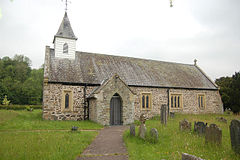Manafon
| Manafon | |
|---|---|
 St Michael's Church, Manafon |
|
| Manafon shown within Powys | |
| Population | 301 |
| OS grid reference | SJ10SW24 |
| • Cardiff | 78.4 mi (126.2 km) |
| • London | 155.3 mi (249.9 km) |
| Community |
|
| Principal area | |
| Country | Wales |
| Sovereign state | United Kingdom |
| Post town | Y Trallwng |
| Police | Dyfed-Powys |
| Fire | Mid and West Wales |
| Ambulance | Welsh |
| EU Parliament | Wales |
Manafon is a small rural community located in the hills of Montgomeryshire, the Northern part of the Welsh county of Powys [formerly Montgomeryshire]. The Parish focuses on the valley of the River Rhiew that runs east to west into the River Severn". The community of Manafon consists of "two main villages within about a mile of one another, Manafon and New Mills. The remainder of the population lives in scattered farms and dwellings and in the small rural settlement of The Green."
The village is 8 miles (14 km) from Welshpool, 78.4 miles (126.2 km) from Cardiff, and 155.3 miles (249.9 km) from London.
In 2011 the population of Manafon was 301 with 18.4% of them able to speak Welsh. Between 1841 and 1901 the population declined from 795 to 501.
The name was recorded in 1254 as Manauon with Mannavon in 1338, and "the modern spelling first appears early in the reign of Elizabeth, c.1566." Experts now suggest that it means "the ‘plain associated with Anafon’, where the first element is Welsh ma meaning ‘plain, field or place’ and the second a personal name", rather than afon meaning ‘river’, as in Stratford-upon-Avon, which was the earlier view.
From A Topographical Dictionary of Wales by Samuel Lewis, 1833:
St Michael's and All Angels Church is an active Anglican church in the parish of Llanfair Caereinion, Llanllugan and Manafon, built in stone with slate roof. The church has been designated by Cadw as a Grade II* listed building. There is documentary evidence relating to a church on the site in 1254 and 1291 but otherwise nothing is known of its history until it was restored in 1859.
And in 1869 Glynne wrote that "this church has been so completely renovated, as scarcely to retain any ancient features".
Notable former vicars include the poets Gwallter Mechain and R. S. Thomas.
...
Wikipedia

